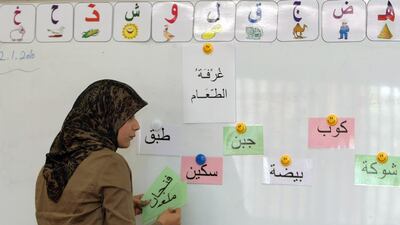Arabic is dying out, that’s the story we’ve been told for decades now. The prevalence of English in the international media and the general use of the language on the internet means that English has become what we are all supposed to focus on. But am I, as one of a few hundred students just graduated with a degree in Arabic, supposed to sit back and cry over my useless qualification? Not so, according to the British council.
A new report commissioned by the organisation, whose remit is the propagation of British culture and the English language, lists the “Top 10 Languages of the Future”. The report, which was commissioned to find out which languages the UK needs most and why, ranks Arabic at number two.
But how can that be the case? It was only a few months ago that this newspaper published a special report suggesting that Arabic was “at risk of being a foreign language in the UAE”. So why is the British Council now working with UK schools to teach 1,000 children (rising to 5,000 in September) how to start their day with sabah al khair? According to the British Council, the answer is mainly based on three factors. First, the number of emerging high growth markets that speak Arabic. Second, cultural, educational and diplomatic factors, which essentially means that without Arabic speakers, the UK won’t be able to work well with a host of countries. And third, the level of English proficiency in Arabic- speaking countries (very low) and the level of Arabic proficiency in the UK (1 per cent of the population suggests that it could hold a conversation in Arabic).
What does this have to do with the UAE? Well, it shows that Arabic is not a language to be left to wilt. The challenge now is to be at the forefront of Arabic teaching. In a previous piece, I wrote about how the UAE needed to teach foreigners Arabic if the language were to survive. My focus was that Arabic is becoming a second language thanks to a sea of English-speakers without any interest, reason or resources to learn the language and that the UAE needs to start growing the number and output of language institutes in the country.
This new report tells us that there is a demand for foreigners to learn Arabic and it will grow. It won’t just be oddball language-fanatic students like me choosing to study Arabic in higher education any more. As the economic stature of the language increases, the number of people seeing it as a viable path to a better future grows.
The UAE has the chance to be the destination of choice for students who choose to learn Arabic but two things need to change. First, the general complacency about Arabic. The expectation that someone should speak English needs to change into the expectation of at least minimal proficiency in Arabic. Second, the teaching needs to be overhauled. Arabic lessons in school have been disregarded for too long. Both in local and international schools, the standard of teaching needs to rise. With this new interest in the language from the western world, why not team up internationally to tackle the issue?
Groups linking Arabic language teachers all over the world could look in to what should be done to improve teaching. As we start to see Arabic as a more international language, not just one to be spoken by Arabs, the issue of teaching it would become international.
The Arabic language is not dying out. In fact, to speak it has become an even more important skill around the world. Seeing this happening, the UAE has the chance to make itself more of a hub and a connector between the Arabic countries and the rest of the world. By making itself an invaluable station for those who want to learn the language, the UAE can foster growth, understanding and a generation of language learners with an interest not only in Arabic culture and its survival, but in the UAE specifically. As the UK starts to see the importance of teaching Arabic to its students, maybe the UAE should start to take it seriously too.
James Tennent is a freelance writer in London
On Twitter: @duckytennent

